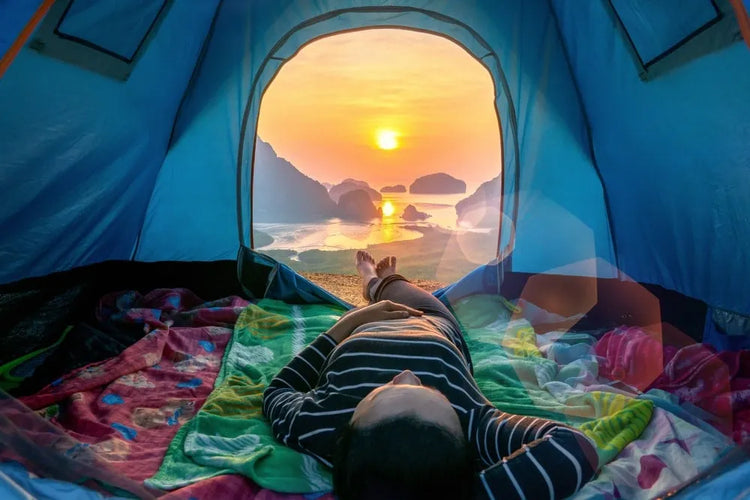Camping offers the opportunity to reconnect with nature, escape from the hustle and bustle of daily life, and enjoy a unique adventure. However, for many, getting a good night's sleep while camping can be a challenge. The unfamiliar environment, sounds of wildlife, and discomfort of sleeping on the ground can make it difficult to rest. Fortunately, with the right preparations and strategies, you can ensure that you get the rest you need to enjoy your camping trip to the fullest. Here's an in-depth guide to help you achieve a night of restful sleep in the great outdoors.
1. Choose the Right Campsite:
- Location is Key: Select a campsite away from noisy areas, such as roads, playgrounds, and busy trails. Avoid setting up near water sources as they attract wildlife and can be a source of mosquitos.
- Terrain Matters: Look for level ground. Avoid places like hills where water can run, or the windy side of a mountain.
- Safety First: Ensure the area is safe from falling branches, flooding, or any wildlife activity.
2. Invest in Quality Sleeping Gear:
- Sleeping Pad or Mat: This is essential not just for comfort but for insulation. The ground can sap body heat, making a good pad imperative.
- Sleeping Bag: Choose one suitable for the season. A mummy-shaped bag retains heat efficiently.
- Pillow: Compact camping pillows are available that offer decent neck support.
3. Regulate Your Temperature:
- Layer Up: Wear moisture-wicking base layers to bed and add layers if it gets colder.
- Wear a Beanie: A lot of body heat can be lost through the head, so wearing a beanie can keep you warmer.
- Warm Your Sleeping Bag: Fill a water bottle with hot water and place it at your feet.
4. Create a Bedtime Routine:
- Wind Down: Just as at home, a routine can signal to your body that it's time to sleep. This could involve reading a book, practicing deep breathing exercises, or listening to calming nature sounds on your smartphone or portable speaker.
- Limit Screen Time: The blue light from screens can interfere with the production of melatonin, a hormone that regulates sleep. If you must use a device, switch it to 'night mode' to reduce blue light exposure.
5. Optimize Your Sleeping Environment:
- Limit Light: Use an eye mask to block out unwanted light, including the early morning sun.
- Manage Noise: Earplugs can be helpful if you're a light sleeper. Alternatively, white noise apps can drown out the sounds of nature if they're too disruptive.
- Keep Bugs Away: Use a tent with good mesh screening. Consider a natural bug spray or even a portable bug zapper.
6. Watch What You Eat and Drink:
- Limit Caffeine and Alcohol: Both can interfere with your sleep cycle. Try to consume them earlier in the day or avoid them altogether.
- Stay Hydrated but Be Strategic: Drinking water is essential, but try to limit your intake before bed to minimize nighttime trips to the bathroom.
7. Mind Your Safety:
- Secure Food: To avoid attracting wildlife, always secure your food in bear canisters or hang it from a tree.
- Stay Organized: Keep essential items like flashlights, bear spray, or a whistle near you in case of emergencies.
- Be Bear Aware: If you're in bear country, be knowledgeable about bear safety practices.
8. Embrace Natural Sleep Aids:
- Herbal Teas: Consider teas like chamomile or valerian root which can have calming effects.
- Natural Supplements: Melatonin can help regulate sleep. Always consult with a healthcare professional before taking any supplements.
9. Address Common Camping Discomforts:
- Opt for a Tent Fan: This can circulate air and provide white noise.
- Stretch: Doing a few stretches before bed can help prevent cramps and muscle discomfort.
Conclusion:
Sleeping soundly while camping may require some adjustments and preparation, but with the right approach, you can wake up feeling refreshed and ready to tackle the day's adventures. Remember, the key is to recreate, as closely as possible, the conditions and routines that promote sleep at home while adapting to the camping environment. With time and practice, you'll find what works best for you and achieve restful sleep under the stars. Safe camping and sweet dreams!
Holiday Surprises: Navigate Our Comprehensive Guide to the 11 Best Stocking Stuffers for Campers and Hikers


